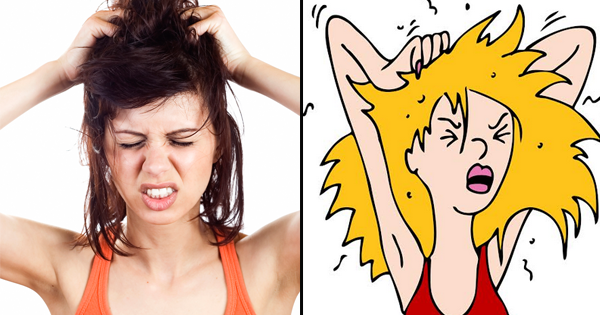Advertisement
Doctors have determined that the most common causes for an itchy scalp are dandruff, fungal infection, lice, allergic reactions, and autoimmune diseases.
If you have dandruff, then your itches will be accompanied by tiny, white flakes dusting your hair and shoulders.
Dandruff can arise from two different conditions. When your body produces too much yeast on your scalp, your scalp will respond by becoming inflamed and itchy, and oftentimes flake off onto your shoulders. If you also happen to be overstressing your immune system – physically or emotionally – the skin cells on your scalp can start producing and attempting to replace themselves too quickly, resulting in the rapid shedding of skin – dandruff.
Unfortunately, it’s not always easy to determine how a dandruff problem arises, so aside from trying to destress yourself and use over-the-counter dandruff shampoo, there’s not much you can do.
If your scalp is caused by a fungal infection, you’ll be able to identify it by the red rash and black, stubbly appearance of your scalp. This infection is known as ringworm infection – but it’s not caused by worms. You may have unknowingly contracted this infection if you were in a communal area (like a locker room) where the fungus lingered, or used someone’s infected brush.
You will need to visit your doctor to get an anti-fungal medicine prescribed to treat this.
If your itches are caused by lice, you’ll be able to see the adult lice and their eggs (nits) attached to individual hairs. You will need to use an over-the-counter, anti-lice shampoo to treat these symptoms, and perhaps avoid sharing personal use items in the future.
If your scalp became itchy after using a particular hair product, then you’re experiencing an allergic reaction to the chemicals. Don’t worry – there’s nothing wrong with your health if this happens. Just go to the doctor, see if they can determine which chemical triggered the reaction, and get some medication to calm your rash.
If, however, none of these symptoms of scalp itches fit your condition and you’ve tried to use anti-dandruff shampoo, according to the instructions on the bottle, for several weeks to no avail, it’s time to visit your doctor.
Having an itchy scalp that doesn’t respond to OTC treatments often indicates that there’s a deeper problem at hand – like the autoimmune disease, psoriasis, whose causes can be incredibly difficult to pinpoint and cause irreversible hair follicle and skin damage.
When in doubt, stop by the doctor and stop using OTC products if they still aren’t helping after a month. There’s no point in risking your physical health just to avoid the doctor.




